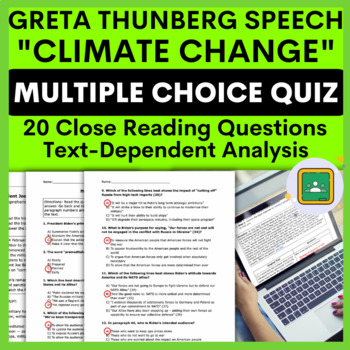Greta Climate Speech Multiple Choice Quiz Close Reading & Rhetorical Analysis
- PDF
- Google Apps™

Description
PRINTABLE or DIGITAL Google Doc work packet. Ready to be assigned on Google Classroom. You will save time because an answer key and detailed lesson plan are included, and you will have a rigorous and engaging lesson aligned to standards on reading informational texts. Students will love reading about current events. This speech by Greta Thunberg on climate change is perfect activity for Earth Day or Women's History Month.
In this activity, students will...
1. Evaluate Greta Thunberg's argument by reading the speech
2. Comprehend & Analyze Greta Thunberg's speech by reading closely
3. Answer text-dependent multiple choice questions
Students can complete this activity independently with very little teacher guidance! Relax while students work. The packet can be used for classwork, homework, flipped learning, blended learning, distance learning, Google classroom, and extension activities. Great for 6th-8th grades, and 9-12 grades. The themes and content are most appropriate for middle school students and high school students.
WHAT'S INCLUDED:
■ DIGITAL or PRINTABLE Google Doc handout
■ Greta Thunberg's "Climate Change" speech transcript
■ 20 multiple choice text-dependent questions
■ Quiz also available on Google Forms
BROAD CONCEPTS COVERED:
■ Close reading
■ Reading comprehension
■ Reading informational texts
■ Rhetorical analysis
■ Make inferences
■ Identify explicit information
■ Identify and analyze key words and phrases
■ Evaluate key words and phrases
■ Evaluate arguments
■ Evaluate claims
■ Identify and analyze word use
■ Identify and analyze structure
■ Identify and analyze purpose
■ Rhetorical devices
WHY USE THIS PRODUCT IN YOUR CLASS?
■ Gives students time to practice reading and writing skills
■ Relevant and timely resource for current events
■ Great activity for seasonal holidays including Earth Day and Women's History Month
■ makes learning new skills easier
■ GREATLY reduces high-stakes test prep
■ Allows students to work at their own pace
■ Covers most standards in Common Core and prepares students for AP Language
■ Has a quick grade option in the answer key
■ Print and go! (or assign and go!)
■ Created by a 9th grade English teacher
■ Used successfully in public school classrooms
■ Perfect for Distance Learning, Blended Learning, Flipped Learning, or regular face-to-face instruction
_____________________________________________________________
Follow Geoffrey's Classroom for new products like this one!
RELATED PRODUCTS
Joe Biden "Russia's Attack" Multiple Choice Close Reading & Analysis Quiz
MLK Multiple Choice Quizzes Close Reading & Literary Devices "I Have a Dream"
MLK Close Reading and Comprehension Quiz “I Have a Dream” Speech
MLK Lit Devices & Rhetorical Analysis Quiz "I Have a Dream" Speech
MLK Vocabulary Flash Cards “I Have a Dream” Speech and Google Slides





